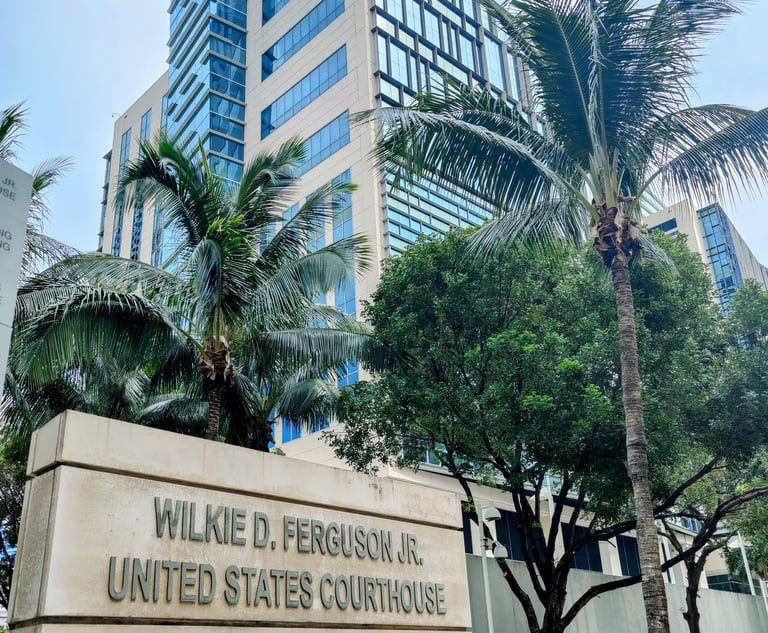Agriculture Commissioner Candidates Take Aim at NAFTA
Only David Walker, a marine biologist from Fort Lauderdale and one of two announced Democratic candidates, voiced straight opposition to a withdrawal from NAFTA.
May 29, 2018 at 01:00 PM
7 minute read

Florida's next agriculture commissioner likely will back White House efforts to change the North American Free Trade Agreement as a way to help the state's farmers.
Worried about the impact on Florida farmers, state Agriculture Commissioner Adam Putnam has been a frequent critic of the 24-year-old trade deal between the United States, Canada and Mexico.
But as Putnam prepares to leave the commissioner's job after the November elections, most of the announced candidates from both parties also point to produce dumping from Mexico as one of the biggest negatives in Florida from the pact, which the Washington, D.C.-based Peterson Institute for International Economics has touted as a boon nationally to sectors ranging from oil and natural gas to beef, apple and soybean growers.
Only David Walker, a marine biologist from Fort Lauderdale and one of two announced Democratic candidates seeking to replace Putnam, voiced straight opposition to a withdrawal from NAFTA.
“Free trade allows for exchange of goods, cheaper prices for consumers, and export income for small and middle size businesses in the state,” Walker said.
The other candidates offered varied approaches they would employ in pushing the White House to help Florida's agriculture industry.
State Rep. Matt Caldwell, R-North Fort Myers, echoed the tone of President Donald Trump, saying NAFTA has “choked American jobs, and manufacturing and agriculture have suffocated the most.”
Caldwell also warned that if “unfair trade” practices remain unfixed in a new NAFTA deal, “we can expect Florida-grown goods to disappear from supermarket shelves.”
“American job-creators hire workers with care; Mexican competition pays the lowest possible wage,” Caldwell said. “American farmers stick to strict quality controls; the quality of Mexican products is unverifiable.”
Caldwell said he intends to expand the Florida Department of Agriculture's export-promotion efforts, both domestically and internationally, while working with federal agriculture inspectors to monitor Mexican imports entering Florida.
“I have heard the common cry from this pillar of Florida's economy: Mexico has been a bad partner,” Caldwell said. “With NAFTA, Mexican growers take market share, slash prices, and target Florida farmers to put them out of business.”
State Sen. Denise Grimsley, a Sebring Republican vying to replace Putnam, agreed that Trump is “on the right track” in insisting on a better deal for farmers and consumers.
“As commissioner, I would encourage the president to stay the course until concessions are agreed to which, at a minimum, should allow American producers to challenge violations of the agreement,” Grimsley said. “We need the same trade remedies made available to our seasonal and perishable fruit and vegetables as any other commodity receives; specifically, we need better attention to use of anti-dumping and countervailing duties.”
Grimsley said despite positives that NAFTA has created, it has left the state's farmers shouldering the consequences of dumping practices by Mexican agricultural interests that have hindered Florida produce industry, including tomatoes, bell peppers and blueberries.
“Put me in a ballgame where I'm handcuffed and I'll lose every time; and that's the impact of NAFTA on Florida,” Grimsley said.
As for the free-trade moniker of the deal, Grimsley said everyone needs to play by the same rules.
“At a minimum, growers need the ability to directly challenge foreign trade practices that violate the terms of the agreement,” Grimsley said. “The current NAFTA agreement is void of an effective grievance process for our seasonal and perishable commodities. Mexican producers are not held to the wage requirements, environmental regulations, or workplace standards that we hold ourselves to in the U.S. and may even benefit from drug cartel backing.”
Former state Rep. Baxter Troutman, a Winter Haven Republican competing with Grimsley and Caldwell, said the deal sacrificed some crops and with farmers and ranchers “caught in the crosshairs,” Florida has felt pain from the moment the deal was implemented.
“I would support a withdrawal from the deal” Troutman said. “But first, I would advise the White House to end the agreement over time and allow the market to balance itself. I am concerned with unintended consequences with unilateral trade actions. We recently saw increased tariffs on certain Chinese products lead to a threat for U.S. soybeans. I want to avoid these threats for major Florida crops.”
Jeff Porter, a Democrat and the mayor of Homestead, also said that while NAFTA has helped Florida exports, he would push the White House to strengthen the deal to stop Mexican seasonally dumped produce.
“NAFTA has helped Florida as we export almost $12 billion in goods and produce to Canada and Mexico each year. This is a double-digit increase since the agreement was signed in 1992,” Porter said. “These exports are important to both the family farm and large agricultural businesses alike. But, like all trilateral agreements there are unintended consequences that hurt the parties involved; and outright cheating that must be addressed.”
But Porter doesn't back a complete withdrawal from the deal.
Instead, as agriculture commissioner, he said he would advocate for Mexico and Canada to either honor the “spirit” of the agreement or he'd push for stiffer penalties on actions that harm Florida's growers and ranchers.
“I would prefer to see changes made to the current agreement which will protect Florida's workforce and businesses alike,” Porter said. “If Mexico and Canada refused to work on some common-sense solutions to strengthen the agreement, then yes, we must be willing to walk away from the deal.”
Republican Mike McCalister, a retired Army colonel from Plant City running for agriculture commissioner, didn't respond to requests for comment.
As for Trump's threats to impose and raise tariffs to balance international trade, Caldwell said tariffs “are a blunt tool and should not be considered without serious pause. However, Mexico has already been found guilty of actively dumping product in order to destabilize our ag industries.”
Caldwell argued that “NAFTA is not actually free-trade” as one would equate in commerce within the United States.
“There are no tariffs or quotas between each state; everyone is subject to the same set of laws and competes on a level playing field,” Caldwell said. “While states may make more stringent labor, wage, and environmental laws, the national policy is uniform. This is the fundamental imbalance with Canada and Mexico. They have widely divergent standards for labor, wage, and environmental regulation. There is no parity under the rule of law.”
Grimsley agreed Trump has “wisely raised the possibility of tariffs” to negotiate better deals.
“I share the president's view that the threat of tariffs will compel more equitable terms of any agreement,” Grimsley said. “The U.S. is the most lucrative consumer market per-capita in the world and we must always negotiate from that position of strength.”
Troutman said he generally supports free markets and opposes tariffs. “However, Florida's ag producers need to have a fair playing field,” he said.
“Countries utilizing unfair trade practices need to be punished immediately and effectively,” Troutman said.
Porter said he considers tariffs a negotiating position. But he's less inclined to employ them, preferring continued negotiations, as “this deal has benefited the three countries for too long to start a trade war.”
“I would use tariffs as the stick and hold out a carrot to come to some common-sense agreement that would help Florida's farmers, ranchers, and businesses thrive, but not be taken advantage of anymore,” Porter said.
Walker was the most tepid on Trump's use of tariffs, saying the “form of protectionism” is only justified when there are “unfair trade practices that are harmful to Floridians.”
“The problem with tariffs are that each country can impose its own standard or rate if there is no agreement, which will be detrimental to Florida businesses that depend on export, such as our agriculture industry,” Walker said.
Jim Turner reports for the News Service of Florida.
This content has been archived. It is available through our partners, LexisNexis® and Bloomberg Law.
To view this content, please continue to their sites.
Not a Lexis Subscriber?
Subscribe Now
Not a Bloomberg Law Subscriber?
Subscribe Now
NOT FOR REPRINT
© 2025 ALM Global, LLC, All Rights Reserved. Request academic re-use from www.copyright.com. All other uses, submit a request to [email protected]. For more information visit Asset & Logo Licensing.
You Might Like
View All
'Close Our Borders?' Senate Judiciary Committee Examines Economics, Legal Predicate for Mass Deportation Proposal
3 minute read

'Stab Venequip in the Back': Caterpillar Faces $100M Lawsuit in Miami Federal Court
3 minute read
Another Roundup Trial Kicks Off in Missouri. Monsanto Faces 3 Plaintiffs
4 minute readTrending Stories
- 1DC Lawsuits Seek to Prevent Mass Firings and Public Naming of FBI Agents
- 2Growth of California Firms Exceeded Expectations, Survey of Managing Partners Says
- 3Blank Rome Adds Life Sciences Trio From Reed Smith
- 4Divided State Supreme Court Clears the Way for Child Sexual Abuse Cases Against Church, Schools
- 5From Hospital Bed to Legal Insights: Lessons in Life, Law, and Lawyering
Who Got The Work
J. Brugh Lower of Gibbons has entered an appearance for industrial equipment supplier Devco Corporation in a pending trademark infringement lawsuit. The suit, accusing the defendant of selling knock-off Graco products, was filed Dec. 18 in New Jersey District Court by Rivkin Radler on behalf of Graco Inc. and Graco Minnesota. The case, assigned to U.S. District Judge Zahid N. Quraishi, is 3:24-cv-11294, Graco Inc. et al v. Devco Corporation.
Who Got The Work
Rebecca Maller-Stein and Kent A. Yalowitz of Arnold & Porter Kaye Scholer have entered their appearances for Hanaco Venture Capital and its executives, Lior Prosor and David Frankel, in a pending securities lawsuit. The action, filed on Dec. 24 in New York Southern District Court by Zell, Aron & Co. on behalf of Goldeneye Advisors, accuses the defendants of negligently and fraudulently managing the plaintiff's $1 million investment. The case, assigned to U.S. District Judge Vernon S. Broderick, is 1:24-cv-09918, Goldeneye Advisors, LLC v. Hanaco Venture Capital, Ltd. et al.
Who Got The Work
Attorneys from A&O Shearman has stepped in as defense counsel for Toronto-Dominion Bank and other defendants in a pending securities class action. The suit, filed Dec. 11 in New York Southern District Court by Bleichmar Fonti & Auld, accuses the defendants of concealing the bank's 'pervasive' deficiencies in regards to its compliance with the Bank Secrecy Act and the quality of its anti-money laundering controls. The case, assigned to U.S. District Judge Arun Subramanian, is 1:24-cv-09445, Gonzalez v. The Toronto-Dominion Bank et al.
Who Got The Work
Crown Castle International, a Pennsylvania company providing shared communications infrastructure, has turned to Luke D. Wolf of Gordon Rees Scully Mansukhani to fend off a pending breach-of-contract lawsuit. The court action, filed Nov. 25 in Michigan Eastern District Court by Hooper Hathaway PC on behalf of The Town Residences LLC, accuses Crown Castle of failing to transfer approximately $30,000 in utility payments from T-Mobile in breach of a roof-top lease and assignment agreement. The case, assigned to U.S. District Judge Susan K. Declercq, is 2:24-cv-13131, The Town Residences LLC v. T-Mobile US, Inc. et al.
Who Got The Work
Wilfred P. Coronato and Daniel M. Schwartz of McCarter & English have stepped in as defense counsel to Electrolux Home Products Inc. in a pending product liability lawsuit. The court action, filed Nov. 26 in New York Eastern District Court by Poulos Lopiccolo PC and Nagel Rice LLP on behalf of David Stern, alleges that the defendant's refrigerators’ drawers and shelving repeatedly break and fall apart within months after purchase. The case, assigned to U.S. District Judge Joan M. Azrack, is 2:24-cv-08204, Stern v. Electrolux Home Products, Inc.
Featured Firms
Law Offices of Gary Martin Hays & Associates, P.C.
(470) 294-1674
Law Offices of Mark E. Salomone
(857) 444-6468
Smith & Hassler
(713) 739-1250






